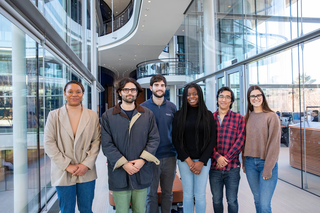
Yale University’s New Haven Hiring Initiative (NHHI) supports New Haven economic growth by connecting qualified, New Haven residents to open positions at the University.
By the numbers
Whether it’s supporting small businesses, fostering innovation, or expanding educational opportunities, Yale is playing a critical role in helping New Haven build a 21st century economy that benefits all its residents.
-
$135 million
Voluntary payments to be made to New Haven over six years
-
Nearly 6,000
New Haven residents employed
-
$5 million+
Annual taxes paid by Yale, a top three New Haven tax payer
Voluntary Payments
But here’s one of the biggest: in November 2021, Yale and New Haven made history again with a groundbreaking new partnership: a six-year, $135 million voluntary payment to the city to promote inclusive growth and sustained economic development.

Jobs and Training
Good jobs are the lifeblood of any community. That’s why Yale is proud to be New Haven’s largest employer, with nearly 14,000 faculty and staff based in the city—including close to 6,000 residents of New Haven itself.
Yale is committed to creating meaningful career opportunities that strengthen families, support local neighborhoods, and drive long-term economic growth. Through partnerships with community organizations, workforce development programs, and local hiring initiatives, we aim to ensure that New Haven residents have direct pathways to good jobs.


“Working at Yale has been life-changing for me. For the first time in 17 years, I have a job that offers me stability, work-life balance, and access to benefits like medical and dental insurance, PTO, and a retirement plan. My co-workers are like a family.”
Shareema Bowman, Yale employee hired through New Haven Works
Tax Payments
Every nonprofit university in the nation is exempt from paying taxes on their academic property. But, through our community investment program that redevelops nearby property, Yale pays real estate taxes-over $5 million this year-on all of our non-academic properties.

Center for Inclusive Growth
The Yale School of Management (SOM), under the leadership of Dean Kerwin Charles, is leading the university’s efforts to establish the Center for Inclusive Growth, a historic partnership between the City of New Haven and Yale that will develop and implement strategies to ensure inclusive economic growth in New Haven. Yale has committed $5 million to the Center over its first six years.

Innovation and Entrepreneurship
In recent years, Yale and the city of New Haven have worked together to help our city become a national hub for the life sciences industry. In spring of 2021, Yale announced it would be an anchor tenant at 101 College Street in New Haven, a new construction project of offices and biomedical lab space. Yale was also able to help secure a biotech incubator, which will be housed at the site to help attract the best ideas and talent in the nation.
The development of 101 College Street is expected to lead to the creation of roughly 1,000 construction jobs as well as approximately 800 permanent jobs.

Community Investment Program
Yale’s Community Investment Program supports independently owned businesses, bringing jobs to New Haven residents and expanding the city’s tax base. Over 90 percent of our tenants have local or regional owners.
But Yale’s Community Investment Program doesn’t just provide support for businesses once they’re up and running. It also helps promote diversity among aspiring entrepreneurs. Yale has focused on recruiting minority and female-owned businesses to our retail districts, including a growing number of Black-owned businesses

Neville Wisdom, owner of Neville Wisdom Fashion Design Studio
Cultural Resources
One of the reasons the New York Times said New Haven has the “culture of a major metropolis” is because of Yale’s commitment to sharing its resources with the public. Yale’s world-renowned museums, exhibition spaces, concerts, and theatre productions are not only open to the public, but many programs are also free of charge. The Yale University Art Gallery, the Yale Center for British Art, the Beinecke Rare Book & Manuscript Library, and the Yale Peabody Museum all offer a wealth of family-friendly programming and free admission, making world-class cultural experiences accessible to everyone.

Community Voices
No culinary tour of New Haven is complete with a stop at Claire’s Corner Copia, a vegetarian haven that has served students, faculty, and local New Haven residents for nearly half a century. Since opening the restaurant with her husband in 1975, Criscuolo has had a front row seat to downtown New Haven’s economic transformation over the last few decades-and Yale’s critical role in it.

